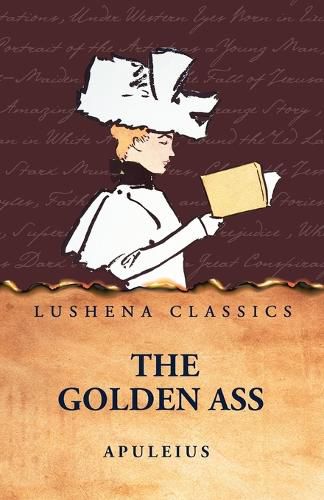Readings Newsletter
Become a Readings Member to make your shopping experience even easier.
Sign in or sign up for free!
You’re not far away from qualifying for FREE standard shipping within Australia
You’ve qualified for FREE standard shipping within Australia
The cart is loading…






This title is printed to order. This book may have been self-published. If so, we cannot guarantee the quality of the content. In the main most books will have gone through the editing process however some may not. We therefore suggest that you be aware of this before ordering this book. If in doubt check either the author or publisher’s details as we are unable to accept any returns unless they are faulty. Please contact us if you have any questions.
The Golden Ass by Apuleius, also known as Metamorphoses, is a Latin novel from the 2nd century AD and is the only ancient Roman novel to survive in its entirety.
The story follows Lucius, a curious and impulsive young man who becomes obsessed with magic. While experimenting with witchcraft, he accidentally transforms himself into a donkey instead of a bird. As a donkey, Lucius endures a long series of misadventures, including beatings, forced labor, and abuse by various masters.
Throughout his journey, Lucius witnesses the corruption and cruelty of human society. Eventually, he regains his human form through the intervention of the goddess Isis, who demands his devotion. The novel ends with Lucius becoming a devout follower of Isis, symbolizing his spiritual rebirth and enlightenment.
The work blends comedy, adventure, satire, and mysticism, and offers a vivid picture of Roman provincial life as well as themes of transformation and redemption.
$9.00 standard shipping within Australia
FREE standard shipping within Australia for orders over $100.00
Express & International shipping calculated at checkout
Stock availability can be subject to change without notice. We recommend calling the shop or contacting our online team to check availability of low stock items. Please see our Shopping Online page for more details.
This title is printed to order. This book may have been self-published. If so, we cannot guarantee the quality of the content. In the main most books will have gone through the editing process however some may not. We therefore suggest that you be aware of this before ordering this book. If in doubt check either the author or publisher’s details as we are unable to accept any returns unless they are faulty. Please contact us if you have any questions.
The Golden Ass by Apuleius, also known as Metamorphoses, is a Latin novel from the 2nd century AD and is the only ancient Roman novel to survive in its entirety.
The story follows Lucius, a curious and impulsive young man who becomes obsessed with magic. While experimenting with witchcraft, he accidentally transforms himself into a donkey instead of a bird. As a donkey, Lucius endures a long series of misadventures, including beatings, forced labor, and abuse by various masters.
Throughout his journey, Lucius witnesses the corruption and cruelty of human society. Eventually, he regains his human form through the intervention of the goddess Isis, who demands his devotion. The novel ends with Lucius becoming a devout follower of Isis, symbolizing his spiritual rebirth and enlightenment.
The work blends comedy, adventure, satire, and mysticism, and offers a vivid picture of Roman provincial life as well as themes of transformation and redemption.